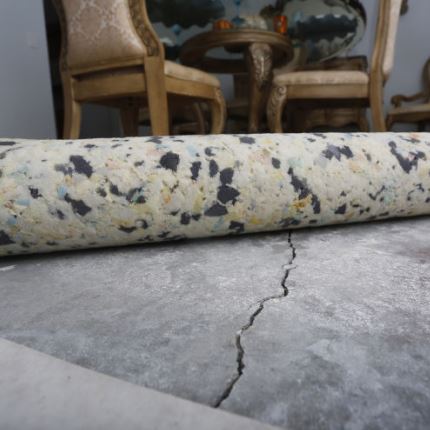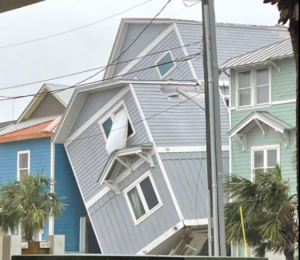 In the heyday of the Great Florida Sinkhole Lottery, Iris and Harry Irizarry would have had all the ingredients for a big cash payout:
In the heyday of the Great Florida Sinkhole Lottery, Iris and Harry Irizarry would have had all the ingredients for a big cash payout:
A sinkhole policy from state-run Citizens Property Insurance Corp.; visible cracking in the walls and floors of the Spring Hill home they bought new in 2003; and a sinkhole confirmed by both an engineer and the Hernando County Property Appraiser’s Office.
But the era of easy sinkhole claims is over, slammed shut by a 2011 overhaul of the state insurance law. Based on the new law, the same engineering firm that found the Irizarrys’ sinkhole — and recommended that it be filled with grout — deemed that it wouldn’t qualify for an insurance claim.
“We pay our insurance but (Citizens) doesn’t want to pay to fix the house, and I can’t sell my house because (it) has no value,” said Iris Irizarry, 64, a retired Head Start director from Brooklyn. “What kind of a law is that?”
In short, it’s a law that has done what it was supposed to do: stem a flood of claims that by 2011 were driving up insurance rates and driving down property values in the “sinkhole alley” of Hernando and Pasco counties.
But concerns are surfacing that the sinkhole fix has gone too far: It has limited the availability of sinkhole insurance and allowed insurers to charge prices rivaling the cost of a standard homeowners policy. It has made it far more difficult for homeowners to qualify for a claim. And by leaving homeowners stuck with sinkhole homes they cannot repair, it has created a potential new drag on property values.
Jim Flynn, marketing manager of LRE Ground Services, one of the most active sinkhole repair companies in Tampa Bay, initially supported the new rules.
“We were advocates for doing something. What was happening was crazy as far as people filing sinkhole claims for something as simple as a driveway crack,” he said. But “it’s really gone from one extreme to the other.”
Along with a widely praised requirement that homeowners use payouts to fix sinkhole damage, the law included a long list of rules that “were definitely a gift to the insurance industry,” said Aaron Kling, a Tampa lawyer who represents homeowners.
It sets standards for structural damage that are almost impossible to meet short of a catastrophic collapse, several sinkhole lawyers said. It allows insurers to pick the engineers who decide whether homes meet that standard and limits coverage to homes only, not driveways, patios or cabanas. It gave insurers more power to deny sinkhole coverage and made sinkhole insurance separate from a base homeowners policy, which helped drive up Citizen’s average sinkhole premiums between 2011 and 2013 from $1,105 to $1,955 in Hernando and from $1,449 to $2,105 in Pasco.
Florida Insurance Commissioner Kevin McCarty credits the overhaul for stemming “rampant fraud and runaway abuse” when thousands were receiving insurance payouts for minor cracking damage. Both the frequency and severity of claims has gone down significantly.
But he also acknowledged critics of the overhaul have a point.
“One could argue the pendulum has swung too far the other way,” McCarty said in an interview. “It makes sense for us to do a more sweeping analysis of the market and see what’s happening.”
Without enough complaints in his office to warrant action, the commissioner said he plans to put out a “data call” to property insurers to examine issues like the affordability of sinkhole insurance and how often claims are being denied under the new system.
“Of course, we’re concerned (if) it’s gone too far,” he said.
Getting past the crisis
The last thing McCarty wants, however, is to go back to the way things were a few years ago, when insurers complained that the escalation of sinkhole claims had become a crisis.
Between 2007 and 2011, the number of sinkhole claims filed with Citizens ballooned from 1,432 to 4,032, nearly half of them in Hernando County.
Citizens incurred $537 million in sinkhole losses in 2011 while collecting only $52 million in premiums. And partly because about 60 percent of homeowners in Hernando had pocketed the payments rather than making repairs, the county lost more than $110 million in taxable property value in 2011 alone.
“There was nothing worse than having 40 to 50 percent of the homes not being fixed,” McCarty said.
Tampa land-use lawyer Ron Weaver equated the sinkhole crackdown to some much-needed “parenting.” But he acknowledges, “whether the children are being held in too tight a straitjacket in the back seat remains to be seen.”
Among the signs of the squeeze: In two years, the number of Hernando, Pasco and Hillsborough homeowners who have sinkhole coverage through Citizens has shriveled by more than 50 percent. Before the 2011 law, known as SB 408, Citizens was averaging 500 to 600 sinkhole claims per month; now it’s seeing 25 to 35 claims monthly. State Farm has seen similar shrinkage, from handling 769 claims in 2011 to just 107 last year.
The situation has left lawyers who specialize in sinkhole cases bemoaning the dying years of a once very-lucrative era.
With a five-year statute of limitations to file, some 2009 and 2010 cases are still wending their way to the courthouse, said local lawyer Rob Nipps, who recently launched his own practice after years working for one of the dominant sinkhole litigation firms, Marshall Thomas & Burnett.
“But over the next year or two that will start to fade off,” Nipps said. “I think in five years, all the claims will be gone.”
Spring Hill, a Hernando community that has long been one of the epicenters of sinkhole claims, is illustrative of what has happened.
A couple of years ago, Flynn of LRE Ground Services could rattle off 30 jobs his company was handling there; now he’s hard-pressed to cite one or two. The few repair jobs under way involve cases that have lingered in litigation pre-dating the 2011 legislation.
“Most of the work the contractors are getting now is old stuff,” Flynn said on a recent afternoon as he watched two workers drive steel piping more than 70 feet underground so they could pump in grout.
The owner of the home, Tricia Lyons, said her claim languished for a couple of years because Citizens’ initial offer included only $2,000 for cosmetic repairs.
Citizens eventually agreed to pay $14,000 toward cosmetic damage and repair work recently began. But it was too late for Lyons.
While waiting, she and her husband fell behind in mortgage payments, and they recently divorced. They’re now arranging a short sale that may come through before the sinkhole repair is finished.
“We should have had the money way back when, but they refused to write a check,” she said. “We’re now told because of the short sale, we’ll never see the money.”
Bought in 2005 for $248,900, the home is now appraised at only $38,000. “What I’m told by the public adjuster is once you fix the house, you could double the $38,000 and that’s what you could sell it for,” Lyons said. “We’re going to lose no matter what.”
Qualifying difficulties
How much harder is it to qualify for a claim now?
Walter Coleman can show you from his yard in the northern Pasco subdivision of Heritage Pines. Before the new law went into effect, four of his closest neighbors received sinkhole payouts — all of them for damage very much like that in Coleman’s home.
When Coleman, a retired police officer from Philadelphia, first noticed several interior cracks in 2011, he filled them with putty and painted.
When the cracks reappeared, Coleman started to think they might be caused by a sinkhole, especially because the house, built in 1999, was too old to still be settling. He was more convinced his property was riddled with voids after he pushed a gardening stake into a slight depression that had formed in his back yard.
“It went in without any resistance at all,” said Coleman, 73.
He filed a claim with Citizens, which, before the new law passed, would have been required to send out a geologist to look for sinkhole activity and, if the geologist found it, pay to stabilize the home.
Under the new law, Citizens was allowed to choose an engineer to determine whether the cracking met the new standard for structural damage that includes the “leaning or buckling” of load-bearing walls and signs the home is “likely to imminently collapse.”
In November 2012, Citizens denied Coleman’s claim based on the report of its structural engineer, even though the same report said the depression in the back yard “may warrant geotechnical testing.”
“I thought, did the adjuster even read the engineer’s report,” said Coleman, who has challenged the denial in court.
Homeowners are discouraged from challenging the findings of structural engineers because under the new law doing so requires them to pay half the cost of geological testing up to $2,500, said St. Petersburg lawyer Amy Boggs.
And if these tests do reveal an underground void, homeowners often end up in the same situation as her clients in a suit against Citizens, the Irizarrys: with a deep cut in the value of their property and little chance of receiving a payout.
“Really, this is a disincentive for people to identify dangerous sinkhole activity on their property,” she said. “It’s like saying we shouldn’t fill a cavity until you need a root canal. Then we’ll cover it.”
Priced out
Getting approved for a sinkhole claim is one thing. But for many homeowners, particularly in Pasco and Hernando counties, it’s a moot point: They either can’t afford or can’t find coverage anyway.
Pasco County Tax Collector Mike Fasano, who frequently challenged Citizens Property rates during his years in the Florida Legislature, continues to field complaints that sinkhole premiums of $3,000 or more are pricing people out of the market. Some who have had previous sinkhole claims or repairs, he says, can’t find coverage at any price.
“God forbid if you get a mortgage company that says, ‘We want you to get sinkhole coverage.’ Forget it,” Fasano said. “It’s killing property values.”
Ginny Stevens of New Port Richey said she was forced to drop sinkhole coverage due to the expense, and her parents did the same with their home.
Stevens previously used a sinkhole claim to repair her damaged house, including chemical grouting and putting in a new foundation. Even after the repairs, she was quoted premiums between $2,000 and $6,000 to add sinkhole coverage to her homeowners policy.
“We have this beautiful home,” she said. “We put a lot of extra money into it to make sure it’s stable and we’re still getting screwed.”
Stevens said she’d like to move to Ohio, but her house is so undervalued — plummeting from $350,000 five years ago to an estimated $125,000 today — she can’t sell it.
“We will either stay in our house until we die or we will walk away from the house,” Stevens said. “We want to move but no way we can sell our home. … We’re stuck. We are so stuck.”
Elsewhere in New Port Richey, homeowner Allan Schwartz said he was told it would cost an extra $3,400 to add sinkhole coverage. He passed.
Schwartz doubts anyone will want to buy into a neighborhood with a sinkhole reputation, knowing that they either can’t get sinkhole coverage or can’t afford it. “I’m not going to pay top dollar for a home that you may have to pay $30,000 to fix in a few years. How is Citizens allowed to get away with this?”
Earlier this year, McCarty, the state insurance commissioner, rejected Citizens’ initial plan to raise sinkhole rates even further in Hernando. A “pause” in higher rates is “probably appropriate,” he said in an interview. But he said he needs more data before entertaining a rate rollback.
Beyond paying higher rates, sinkhole policyholders are feeling financial pain in another way.
Citizens has shifted to a 10 percent deductible on sinkhole coverage, far higher than the 2 to 5 percent deductible for other perils like hurricanes. That looks attractive to the financially strapped homeowner facing a multithousand-dollar sinkhole premium.
But when it comes time to pay up, it can be a shocker.
Underpinning a home with sinkhole damage may cost $10,000 to $20,000. Compaction grouting, a more durable and costly method, could cost up to $100,000. Translation: With a 10 percent deductible, a homeowner would have to pay $30,000 out of pocket to fix a house valued at $300,000 before any insurance kicks in.
St. Petersburg sinkhole plaintiff attorney Hans Haahr said the combination of a high premium, high deductible and little likelihood of a successful claim means “there really is not sinkhole coverage now.”
Homeowners could be better off saving their money and — in the worst case scenario — just relying on the catastrophic ground collapse coverage that’s included in all homeowners’ policies, he said.
“Citizens took over such a big portion of the industry that they can dictate to everybody what they want to do and not have the decency to pay out,” Haahr said.
New realities
From the vantage of Citizens Property Insurance, the sinkhole overhaul has worked out just as it should have.
“I don’t think it’s gone too far,” said Elaina Paskalakis, vice president of claims litigation at Citizens. “I truly believe it’s clarified for the industry what triggers coverage. … From our perspective, we’re very comfortable with it.”
Armed with that clarity of coverage and a war chest to spend on settlements, Paskalakis’ legal team is quickly whittling down its mountain of legacy sinkhole cases.
Citizens is about 50 percent of the way through the cases. Out of the 2,200 remaining, about 900 are expected to settle soon, she said, declining to set a timetable for finishing.
As litigation and the frequency of repairs diminishes, the sinkhole industry is adapting.
Haahr, the St. Petersburg attorney, is taking on more real estate work; LRE Ground Services is handling more interior cosmetic work and commercial sinkhole cases, which haven’t been as heavily impacted by the new rules.
But for homeowners like the Irizarrys, adapting to a new reality isn’t easy.
The county property appraiser used the sinkhole finding to justify slashing the value of the Irizarry’s home by 40 percent, to $53,744.
Iris Irizarry wants to have family from New York visit. But with her damaged-yet-unrepaired home, she’s worried about their safety staying in the house.
“Right now,” she said, “we feel very helpless.”
Source: Tampa Bay Times




